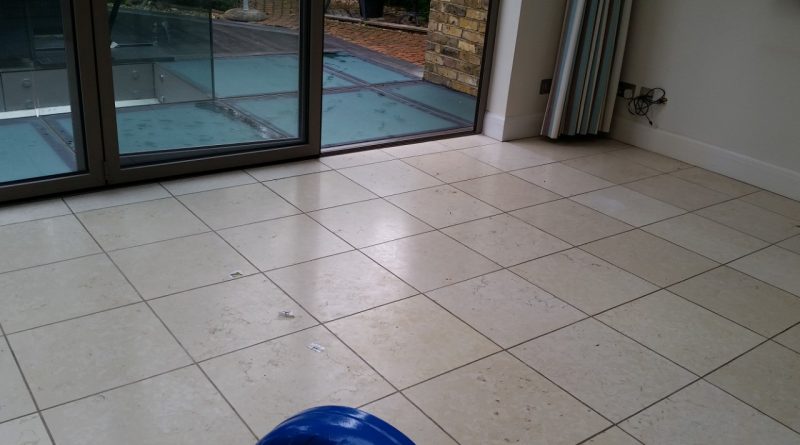Polishing a Large Limestone Tiled Floor in Hammersmith
Recently I paid a visit to a customer in Hammersmith whose whole ground floor was covered in Limestone tiles. It was a nicely situated Victorian house, but the Limestone floor was a big concern for the owner. The floor had been installed during a house renovation approximately seven years earlier and hadn’t been treated since. The Limestone was now looking dull and in need of a renovation to bring back the polished appearance.

Limestone was used throughout the property including the Hallway and Kitchen which are typically the busiest area’s and so not surprisingly they had seen the biggest build-up of soiling. This is not an unusual situation for stone floors which will trap dirt in the pores of the stone once the sealer wears off. Sealer wear is inevitable and will usually last between three to five years depending on use and what is used to clean the floor.

I explained the process of renovating and honing the Limestone and bringing back its appearance, after agreeing on details we chose the dates. The job was scheduled for 3 days to be completed.
Cleaning Limestone Floor Tile and Grout
When we arrived on the first day, we set about covering the skirting boards and furniture, to protect from any splashes. Then starting in the Kitchen and Dining area the first phase involved giving the floor an initial clean using a strong dilution of Tile Doctor Pro-Clean. The primary focus was on the grout lines which were hand scrubbed using a stiff grout brush.
Then the solution was spread all over the tiles and left for approximately ten minutes to allow it to soak into the pores of the stone and break down the dirt and what was left of the old sealer. I used a black scrubbing pad fitted to a rotary machine to work the solution into the floor. Then the floor was then carefully rinsed, and the soil extracted with a vacuum.
The floor was already showing improvement when I moved onto phase two which reconditions the stone using a set of diamond encrusted Burnishing Pads. There are four pads in the set, each one with a different grit from coarse 400-grit through to extra fine 3000-grit. I started with the 400 grit, followed by 800, 1500, 3000 grit to bring back the shine. Water is used to lubricate the process and the floor is rinsed well after each step to remove the fine slurry generated. At the end of the first day the Kitching and Dining section looked really good in comparison to the untouched areas and I hadn’t applied the sealer yet.
Sealing Limestone Floor Tiles
On the second day we started on the Limestone floor in the Hallway using the same technique as before. Being a smaller area, it didn’t take as long to complete, and we were able to make a start on applying a fresh sealer to the floor we cleaned the day before.
Underfloor heating was installed, and this is useful for helping to dry a wet floor however I don’t like to use it when sealing and I asked the owner to switch it off. In my experience you get a better result if the sealer is allowed to dry and cure naturally.
For this floor I used Tile Doctor Colour Grow, Limestone is a light stone and Colour Grow really brings out the brown shades in the stone. It actually works by penetrating into the pores of the stone thereby preventing dirt from becoming ingrained there. As well as protecting the stone it will also make regular cleaning much easier and for polished Limestone you should use Stone Soap which is designed for cleaning sealed stone floors and will help maintain the patina.

The job took 3 days to complete but to do it properly and to a high standard there is no place for a rush or cutting corners. The final result was transformational, and our customer was more than happy.

Source: Limestone Tile Cleaning, Sealing and Renovation Service in West London
